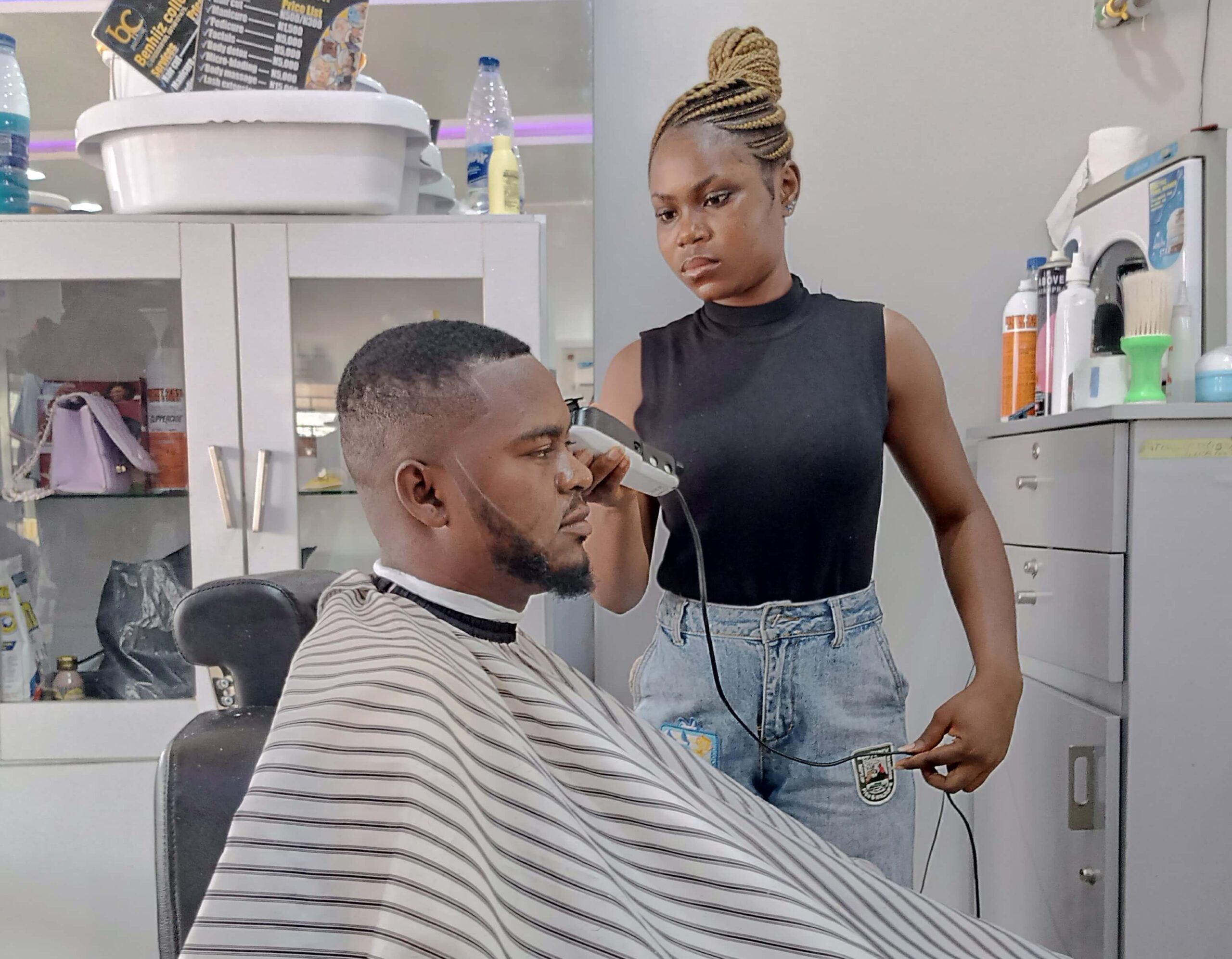Jennifer Ogbonna is a secondary school leaver living in Jikwoyi, a suburb in Nigeria’s Federal Capital Territory, Abuja.
After she graduated from secondary school in 2018, she wrote the Unified Tertiary Matriculation Examination twice but could not secure university admission.
“Things did not work out,” she said.
Besides, the 22-year-old is from a lowly background, which compelled her to hustle for survival. Plus, the situation is aggravated by her mother’s illness.
“My mum, who would have been catering for me, is sick and has not been working for some time,” she told Prime Progress.
Be that as it may, young Ogbonna has found a means of survival in the barbing profession, which she ventured into in October 2022, four years after her secondary school graduation.
“I just have a natural flair for barbing. Besides, I consciously want to avoid the problems that emanate from dealing with women,” she said.
“For me, women are more difficult to deal with. So, I choose barbing because I know my clients will be mostly men, whom I consider easier to relate with”.
Barbing in Nigeria is often considered exclusive to male folks, with only a handful of ladies venturing into it. Ogbonna barbs alongside seven males at AM Barbers, a barber shop in Jikwoyi, where she is the only female.
She said she feels happy about her choice. She spoke with pride when Prime Progress asked for an interaction.
“I know barbing is men’s world, but I like it because I don’t want anything that will bring me in conflict every time with women.”
“Many men tend to appreciate whenever they see a woman doing something meant for men. Some people will just come into the shop and appreciate me with money even if I don’t do anything for them. People have been very encouraging.”
Apart from helping to pay her bills, barbing has been a weapon against boredom and idleness for her.
“Most times, when I am idle at home, I think about many things – stuff like ‘I should have been in a better place. I should be in school or have something doing.’ But, my mum always encourages me,” she said.
She is no longer hurrying to further her education, but it remains in the plan.
“I think this barbing is the most important thing for me now. Every other thing can come later. I am trying to save up money for my university education. So, I won’t go back until I have what it takes.”
The testimonies notwithstanding, Ogbonna yet shared her frustrations.
“Some men come in, and when they see it is a woman in the shop, they say no. They can never allow a woman to barb them. But, as I said earlier, some other men would want to see what you can do,” she said.
“Even when I was learning, a man came here. He was like, ‘can you barb?’ I just laughed. So, one of our bosses told him she would barb you.”
And Ogbonna would not end the conversation without sending a piece of advice to fellow ladies who feel restricted by gender divides to take up certain vocations.
“Sometimes, what you think you cannot do because it is meant for men may be the secret of your success in life,” she said.
“I think society needs to be sensitized and educated to appreciate that anyone can do anything as long as they have the ability and competence required for those jobs. No one should be discriminated against because of their gender orientation.”
Independent thinking
While Ogbonna is happy for the chance to work under others, she is thinking of independence already.
“I need to fix myself first before any other thing, including going to school. My plan is to leave here and open my own barber shop where people will be working for me,” she said.
“So, even when I finally secure admission into school, I am not going to leave this business. I so much love it.”
Jennifer Ogbonna, a 22-year-old secondary school graduate from Jikwoyi, Nigeria, turned to a barbing profession after failing to secure university admission and due to financial constraints exacerbated by her mother's illness. Despite the male-dominated nature of the barbing industry, Ogbonna finds joy and purpose in her work, and often receives encouragement from clients who appreciate her breaking gender norms. This occupation not only supports her financially but also keeps her occupied, preventing idle thoughts about her unrealized academic ambitions.
Ogbonna acknowledges some challenges, such as skepticism from male clients who doubt her abilities, but takes pride in proving them wrong. She also advises other women to pursue vocations traditionally dominated by men, emphasizing that success often lies in unexpected places.
Looking ahead, Ogbonna aims to establish her own barber shop and remain in the profession she loves, even when she eventually resumes her academic pursuits.






